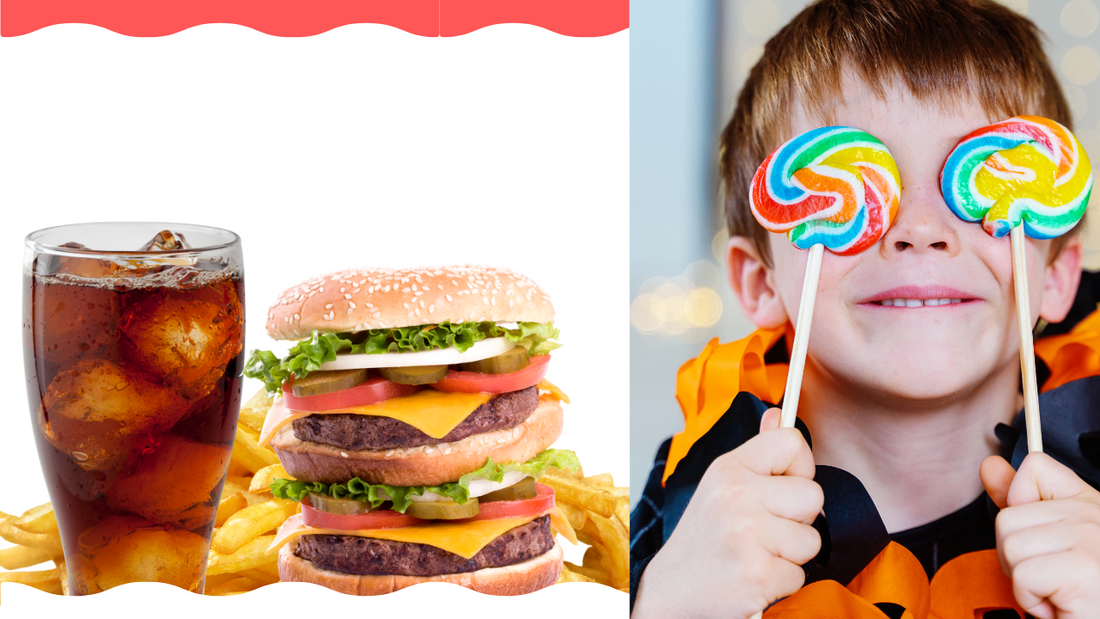Why Eating Junk Food is Bad for Kids?

Share
The Junk Food Trap
Every parent has seen it. Brightly packed chips, burgers dripping with sauces, soft drinks fizzing with sugar. Kids love them. They’re quick, cheap, and everywhere. But what looks harmless as an occasional treat often becomes a daily habit. And that habit silently harms children’s health.
This is why junk food deserves a closer look. Continue reading as we explain the top side effects of junk food and the long-term risks associated with it.
What Counts as Junk Food?
Junk food is any food high in sugar, salt, and unhealthy saturated fats but low in real nutrition. Examples include:
- Packaged chips and fried snacks
- Burgers, pizzas, and fries
- Instant noodles and ready-to-cook mixes
- Candies, pastries, and chocolates
- Sugary drinks, sodas, and energy drinks
These foods may satisfy cravings but they starve the body of essential nutrients.
The Hidden Dangers of Junk Food
Outlining the top 7 harmful effects of junk food on kids:
1. What about Childhood Obesity?
Junk food is calorically dense but offers little in terms of nutrition. Children tend to take in more energy than they expend. This equals weight gain in children. Childhood obesity is now commonplace. And with a child's obesity comes the increased risk for developing adult diseases, such as diabetes, high blood pressure, and joint-related problems, before they hit adulthood!
2. Weak Immunity
If the levels of vitamins, minerals, and antioxidants are low, the immune system will be negatively impacted. Children who regularly consume junk food tend to fall ill more frequently and are the first group to contract cold viruses and influenza, allowing infections to take hold more easily.
3. Poor Concentration in School
High starch, carb, and sugar snacks offer short-term energy surges. These short bursts of energy then cause fatigue, lethargy, and inattention. Junk food junkies have decreased memory and cognitive ability in adult life, making it more difficult for them to achieve academically and in everyday life.
4. Dental Problems
Bacteria in the mouth feed on sugars in soda, chocolate, and pastries, which can lead to cavities, gum disease, and tooth decay. Before you know it, your child has never been to the dentist, and now sees them every month or two!
5. Weak Bones
Carbonated sodas inhibit calcium absorption in the gut. A decrease in calcium levels can cause weak, brittle bones. It is one of the biggest impacts of junk food on health. Not having an adequate amount of calcium during your childhood years may negatively affect height and overall posture due to weak bones.
6. Poor Digestion
Much junk food lacks fiber, which can lead to constipation. High fat content of full meals can lead to acidity and awful stomach cramps. Eating unhealthy food on a regular basis slows down digestion and reduces the body's ability to absorb nutrients.
7. Mood Swings
The sugar high gives instant energy. But the crash can leave kids irritable, anxious, or moody. Many parents notice tantrums after their children have had sweets.
The Psychological Side
The food industry purposefully creates unhealthy food for kids that is addictive. Artificial flavors and sugar hijack the brain’s reward system. More and more economically disadvantaged children in training, also known as those in education, are likely to crave junk food because they consume too much.
The result can be an unhealthy eating pattern. Some children will also use junk food as a particular form of suppressing emotional behavior referred to as "comfort eating." Boredom or stress can contribute to the consumption of packaged snack food and create the beginning stages of an unhealthy emotional eating pattern that often continues strong into adulthood.
Long-Term Risks
The real danger of junk food lies in the future:
- Diabetes at a young age due to continued spikes of sugar
- Heart disease due to excess cholesterol and fat
- Liver issues from processed oils
- Late growth spurts/ delayed puberty
- Learning and behavioral issues
- What starts as a childhood"snack" habit can evolve into an adult health crisis.
Smart Swaps Parents Can Try
Instead of banning junk food outright, replace it with healthier options kids actually enjoy:
- Fruit bowls with honey instead of candies
- Roasted makhana or peanuts instead of chips
- Homemade popcorn instead of fried snacks
- Nut laddoos or dry fruit bars instead of chocolates
- Whole-grain sandwiches with veggie fillings instead of burgers
- Flavored water with lemon or mint instead of sodas
Healthy foods can be made fun. Presentation matters — colorful plates, creative shapes, and family involvement make a big difference.
Tips for Parents to Avoid Junk Foods
- Minimize stock at home: Don't have any form of soda or chips in the kitchen.
- Maintain healthy tiffins: Send fruits, nuts or parathas to school with them.
- Be a role model: Kids imitate habits. You eat healthy food.
- Cook together: Allow your children to help you prepare snacks; they will eat what they make.
- Start the education early: Teach them how to read food labels.
- Set treat boundaries: Junk food is doable but let them know the boundaries.
Role of Schools and Communities
- Parents cannot fight this battle alone. Schools must step in:
- Replace fried snacks in canteens with fruit and milk.
- Organize awareness sessions on healthy eating.
- Encourage physical activity to balance food intake.
- Celebrate festivals with nutritious treats instead of processed sweets.
- When families and schools work together, children develop lifelong healthy habits.
Final Thoughts
Let's face it: junk food is definitely enticing. But at the end of the day, every bite has hidden danger. As parents and/or guardians, we do not want to eliminate all treats — we want to help children develop a balanced perspective. Treats are certainly okay sometimes, but they should be a small part of their daily consumption of wholesome fruits, vegetables, whole grains, nuts, and traditional foods.
Eating well leads to strong bodies. Strong bodies create sharp minds. Sharp minds create a better world.
Therefore, the choice starts at home — one plate at a time.



